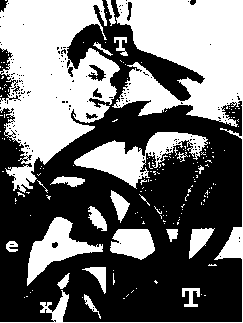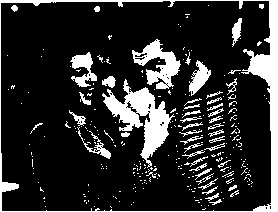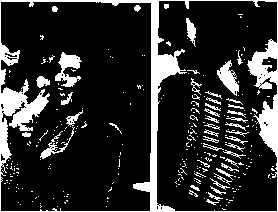| SEXUAL
bodies / Textual BODIES |
SUGGESTIVE
Conversations AMONGST ART liTEratuRe Critical Theory Film &History |
| Dr. Elizabeth Colwill
History & Women’s Studies & Dr. William Nericcio
|
|
|
We are of two minds (at least) as to our course of action--as to our course, really. One would expect no less of MALA, of professors trained respectively as Historian and Literary Critic. Somewhat close, with much overlap, our differences are both minor and informative. So we have let them stand. |
|
|
Elizabeth Colwill Sexuality may be experienced as the most private aspect of personal identity--that which is most our own. To the extent that we assume that sexuality is the "natural" expression of biological sex, it also appears one of the least malleable parts of human experience. Yet in this course we will discover that the meanings of sexuality, like sex and the body itself, are anything but immutable. Designed as a dialogue between theory and texts (literary, historical, visual), Sexual Bodies, Textual Bodies provides the opportunity to examine the relationship between sex, gender, ethnicity, and sexuality in specific historical/geographical contexts. As feminist theorists, cultural critics, and historians of sexuality have argued, the body serves as a privileged site of political struggle precisely because it appears to provide a "natural" foundation for social order. We are interested in the complex and contradictory ways that sexual/sexed subjects deploy sex as metaphor for (apparently unrelated) social conflicts. We are concerned with the process through which we generate knowledge about commerce, industry, science, political order--with specific reference to the body. In short, we will examine the malleability of sexual practices and sex itself, study desire and its regulation, and explore the body as a site of domination and resistance. |
William Nericcio
Both the Humanities and the Social Sciences have been reeling from the impact of recent paradigm shifts. Needless to say, this represents an intellectually healthy turn of events. While the tired and complacent have lamented these disciplinary changes, others have set about carefully and diligently to adjust and comment upon said innovation. Contrary to what one might be led to believe, this set of events is anything but remarkable--change, disorder, and chaos (apparent chaos, one might say) is nothing new in the intellectual history of the West. Idea chroniclers of a sort, our task is to engage these developments critically and creatively, to see how methodological innovations might impact on what we call our practices--we will be doing so with particular regard for that singular construct called "sex." As such, this class aims to survey and critically engage with recent findings which view gender as a construct--sexual practices as channeled behavior of a sort: a syntax, really. The question is basic enough--what is "sex"? How has the history of its development been written? More generally, how has writing, textuality in general, impacted upon 'sex's" metamorphoses in different times and different places. In analytical terms, we might agree that one of the things "sex is" is a kind of name, a shorthand for a complex and circuitous nexus of relations. How we think and write about bodies has been impacted upon by our encounter with living bodies, but also by our no less important encounter with numerous and diverse bodies of ink--the Man Ray photograph Veiled-erotic reproduced above summarizes this view nicely. Our efforts come none too soon. Consider the following: there are a few watershed conceptual categories floating about with attendant disciplines charged with their definition and study. While Economics studies and names systems of exchange with regard to value and monetary movement, Political Science assesses the dynamics of power; meanwhile, Linguistics and the Literatures attend to huge overlapping systems of language. While all three domains intersect in real, determinate and indeterminate ways, and all define and describe sites of production and exchange, and while all have a long history of development in universities, Sex, has not, until recently been taken into account as a name for a system of relations which govern and impact upon the course of economics, politics and language. There was a moment when psychoanalysis vied for the role, but it came up somewhat short. Documenting the written and unwritten role[s] of sex, articulating sex's subtle and suggestive dynamics so as to better our skills as cultural commentators, then, serve as twin goals of our seminar. Admittedly, the subject is highly charged and contentious, and we will have to strive to maintain some form of restraint as we try to describe a system of desires and assigned gendered roles that is not in someway totally predictable, totally mandated by the particular enculturation/cultural immersion to which we have been subject. |
   |
|
|
Critical Journal In addition to required readings for a given day, students will compose 200 word position papers (one-page, double-spaced) in response to the readings. These critical abstracts will be compiled for comment and revision by Drs. Colwill and Nericcio. Presentation Each student will also deliver a problem development presentation (5-8 minutes) where they will outline contentious, provocative or flawed aspects of essays under discussion. |
The students will be expected to compose a 12-20 page essay on a topic developed in conjunction with Professors Colwill and/or Nericcio. This essay represents an internship of sorts, as students will be expected to tailor their essays to the specifications of a journal publishing in the field(s) they elect to address. For example, students dealing with issues of Sex & Literature will fashion essays so as to meet the requirements of Genders or Critical Inquiry; historians and cultural critics will target Representations, differences, Signs or The Journal of the History of Sexuality while Graphic Arts commentators will be urged to familiarize themselves with Art Forum. This approach asks that students think through issues of audience so as to better their writing and research. |
Film Texts

Some Like it Hot, Gilda
The Crying Game
B. Wilder C. Vidor N.
Jordan
Prose Texts
Julia Epstein and Kristina
Straub, eds.
Bodyguards: The Cultural
Politics of Gender Ambiguity
Andrew Parker, Mary Russo,
Doris Sommer, et. al. eds.
Nationalisms and Sexualities
John Fout, ed.
Forbidden History:
The State, Society and the Regulation of Sexuality in Modern Europe
Michel Foucault,
The History of Sexuality,
vol. 1 & 2
Michel Foucault, intro;
Richard McDougall, trans.
Herculine Barbin :
Being The Recently Discovered Memoirs Of A Nineteenth-Century French Hermaphrodite
Hayden Herrera, ed.
Rizzoli Series of
Contemporary Artists: Frida Kahlo
Angela Carter
The Sadeian Woman
: And The Ideology Of Pornography
Severo Sarduy
Written on a Body,
Collected Essays
Kraemer, Heinrich
Malleus maleficarum
Catherine Johns
Sex or Symbol: Erotic
Images of Greece and Rome
Toni Morrison, ed.
Race-Ing Justice,
En-Gendering Power : Essays On Anita Hill, Clarence Thomas, And The Construction
Of Social Reality
Clarice Lispector
Agua Viva
Essays listed below not collected in required anthologies will be available on reserve & in a xerox packet.
Working Semester Schedule
The Week of January 30
First Class, Introduction
Sex & the Disciplines: A review of recent developments in the Humanities and Social Sciences with regard to Gender and Sexuality; also, Discussion: The Autobiographical Bodies of Frida Kahlo & M. Alvarez Bravo (Slides, Critical Terms).
The Week of February 6
Witches, Tribades, Inverts, and New Women
Readings include Malleus Malificarum; Martha Vicinus, "'They Wonder to Which Sex I Belong'": The Historical Roots of the Modern Lesbian Identity," Feminist Studies 18:3 (1992); also, Carroll Smith-Rosenberg, "Discourses of Sexuality and Subjectivity: The New Woman, 1870-1836" & Theo van der Meer, "Tribades on Trial: Female Same-Sex Offenders in Late Eighteenth-Century Amsterdam," in Forbidden History.
The Week of February 13
Greek & Roman Desires Assault 19nth- Century Classics Professors
Readings included Catherine Johns, Sex or Symbol as well as selected readings from Foucault's The History of Sexuality, vol. 2; The Use of Pleasure
The Week of February 20
Sexual Posturing in the French Revolution
Class includes slides on revolutionary and counterrevolutionary pornography as well as readings from Jeffrey Merrick, "Sexual Politics and Public Order in Late Eighteenth-Century France," in Forbidden History and Lynn Hunt, "The Bad Mother," in The Family Romance of the French Revolution (1992).
The Week of February 27
Crossing over/Crossdressing:
A screening of Some Like It Hot, Billy Wilder. Readings include Gary Kate, "D'Eon Returns to France: Gender and Power in 1777" & Kristina Straub, "The Guilty Pleasures of Female Theatrical Cross-Dressing and the Autobiography of Charlotte Charke," in Bodyguard
The Week of March 7
Sexual Commerce: Corpuskapital
Readings include Donna Guy, "White Slavery,' Citizenship and Nationality in Argentina", in Nationalisms and Sexualiities; Norma Alarcon on "La Malinche"; Catherine Gallagher, "The Body Versus the Social Body in the Works of Thomas Malthus and Henry Mayhew," in The Making of the Modern Body; Thomas W. Laqueur, "Sexual Desire and the Market Economy During the Industrial Revolution," in Discourses of Sexuality: From Aristotle to AIDS; and Rosario Castellanos, "Woman and Her Image."
The Week of March 14
The Pursuit of Sodomy
Readings include Janet E. Halley, "Misreading Sodomy: A Critique of the Classification of 'Homosexuals' in Federal Equal Protection Law," in Bodyguards; essays from Kent Gerard and Gert Hekma, eds., The Pursuit of Sodomy: Male Homosexuality in Renaissance and Enlightenment Europe; Erwin J. Haberle, "Swastika, Pink Triangle, and Yellow Star: The Destruction of Sexology and the Persecution of Homosexuals in Nazi Germany" in Martin Duberman, Martha Vicinus & George Chauncey, Jr., eds. Hidden from History: Reclaiming the Gay & Lesbian Past (New York: Meridian, 1990).
The Week of March 21
Citizens Cane & Bi-sexual Menage a quads
A screening of Gilda directed by Charles Vidor; readings from Clarice Lispector and Severo Sarduy. Also from W. Nericcio, "Theory Celebrity Shame and Haircuts, Rita Hayworth.
The Week of March 28 Spring Recess
The Week of April 4
Sexual Science
Londa Schiebinger, "Why Mammals are Called Mammals: Gender Politics in Eighteenth-Century Natural History" (AHR forthcoming); Thomas Laqueur, "Orgasm, Generation, and the Politics of Reproductive Biology" and Schiebinger, "Skeletons in the Closet: The First Illustrations of the Female Skeleton in Eighteenth-Century Anatomy," in The Making of the Modern Body; also, Ruth Perry, "Colonizing the Breast: Sexuality and Maternity in Eighteenth-Century England," in Forbidden History.
The Week of April 11
Sexed Subjects
Selected Readings include Lynn Hunt, "Foucault's Subject in The History of Sexuality," in Discourses of Sexuality: From Aristotle to AIDS; and Michel Foucault, The History of Sexuality, vol 1, trans. Robert Hurley (New York: Pantheon, 1978)
The Week of April 18
Sex, Civilization, Colonialism
Mary Louise Pratt, "Eros and Abolition," in Imperial Eyes: Travel Writing and Transculturation; Franz Fanon, selected essays from Wretched of the Earth; Gayatri Spivak, "What Is Alterity?" in Remaking History and Felicity Nussbaum, "Prostitution, Body Parts, and Sexual Geography," (forthcoming)
The Week of April 25
Disease/Disorder Or Plagues
Ann-Louise Shapiro, "Disordered Bodies/Disorderly Acts: Medical Discourse and the Female Criminal in Nineteenth-Century Paris," in Gendered Domains; Bruce Thomas Boehrer, "Early Modern Syphilis," in Forbidden History; Cindy Patton, "From Nation to Family: Containing "African AIDS," in Nationalisms and Sexualities; and Paula Treichler, "AIDS and HIV infection in the Third World."
The Week of May 2
Transgressions: hermaphrodites
Michel Foucault, ed., Herculine Barbin; Ann Rosalind Jones and Peter Stallybrass, "Fetishizing Gender: Constructing the Hermaphrodite in Renaissance Europe"
The Week of May 9
Othered Worlds
Screening of The Crying Game directed by Neil Jordan; Majorie Garber, "The Chic of Araby: Transvestism, Transsexualism and the Erotics of Cultural Appropriation," in Bodyguards. Judith Shapiro, "Transsexualism: Reflections on the Persistence of Gender and the Mutability of Sex," in Bodyguards.
The Week of May 16
Conclusion
Race-Ing Justice, En-Gendering Power: Essays On Anita Hill, Clarence Thomas, And The Construction Of Social Reality ed.Toni Morrison. 1st ed. New York : Pantheon Books, 1992.

